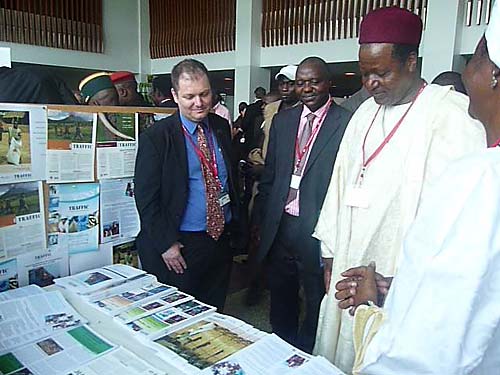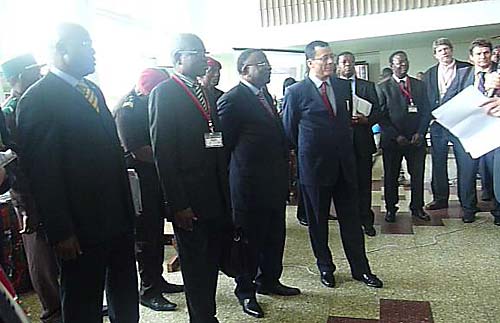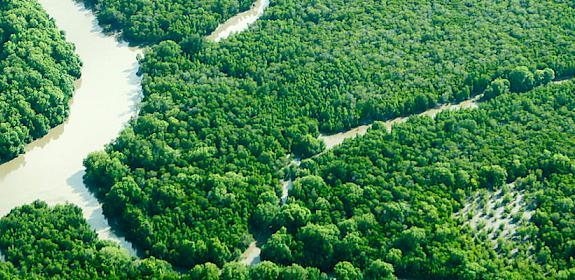Congo Basin partners discuss conservation and sustainable forestry management
Yaoundé, Cameroon, 23rd November 2009—More than 300 experts representing the Congo Basin Forest Partnership (CBFP) * gathered in Yaoundé this month for the 6th Plenary Meeting to discuss conservation and sustainable management of forest resources in the Congo Basin.

HE Emmanuel Bizot, Minister for Water, Forests, Fisheries and Hunting of the Central African Republic and current President of COMIFAC stressed the importance of the meeting and reminded participants that CBFP’s role was to “conduct consultations with partners to maintain the operational capability of COMIFAC (the Central African Forests Commission).”
Germain Ngandjui, manager of TRAFFIC’s Central Africa Programme, congratulated the CBFP partners on their progress in implementing COMIFAC’s Convergence Plan.
He told the meeting that the reduction of illegal trade in wildlife products and tropical timber, preventing unsustainable exploitation and improving transparency and governance in trade at all levels, were all concerns of COMIFAC and CBFP shared by TRAFFIC.
Participants, including ministers and representatives of Central African countries and partner countries from Africa, Europe, North America and Asia, met in four working groups to discuss institutional strengthening and financing of COMIFAC; governance of the forestry sector—in particular with respect to major players such as China; implementation of the COMIFAC Convergence Plan; and reconciling the balance between conservation and sustainable use of forest areas.
Dr Nouhou Ndam, TRAFFIC Central Africa’s Forestry Officer, told the forestry governance group: “China could be a strong agent for change toward sustainable management of natural resources, particularly if Chinese enterprises follow the new code of conduct developed jointly by the Chinese Ministry of Commerce and the Chinese State Forest Administration companies.”
Speaking to the conservation and sustainable land use group, Henriette Bikie, TRAFFIC Central Africa’s Bushmeat Project Co-ordinator, stressed the difficulty of protected areas generating sufficient revenue to benefit local communities and noted: “If protected areas do not contribute adequately to the well-being of local people, perhaps they should be offered compensation, modeled on the fees payable to communities bordering operational forest areas.”
In a big step towards the battle against poaching and illegal logging, the meeting concluded with the signing of an Agreement to launch a transboundary anti-poaching brigade between the Ministers of the Republic of Congo, the Central African Republic and Cameroon.
The anti-poaching brigade will become active in the Sangha Tri-National (TNS), a vast area of forest in Central Africa. The 8.3 million hectares of forests include national parks and surrounding multiple use zones.
Canada has agreed to take over the CBFP’s Facilitation role from 2010–2011, a position previously held by Germany from 2008–2009.

* The Congo Basin Forest Partnership is a non-binding partnership registered with the UN Commission on Sustainable Development. As a “Type II” partnership, it represents a voluntary multi-stakeholder initiative contributing to the implementation of an intergovernmental commitment, i.e. the Yaoundé Declaration, and brings together the 10 member states of the COMIFAC, donor agencies, international organizations, NGOs, including TRAFFIC, scientific institutions and representatives from the private sector. CBFP works in close relationship with the Central African Forests Commission (COMIFAC), the regional body in charge of forests and environmental policy, co-ordination and harmonization, with the objective to promote the conservation and sustainable management of the Congo Basin's forest ecosystems.



